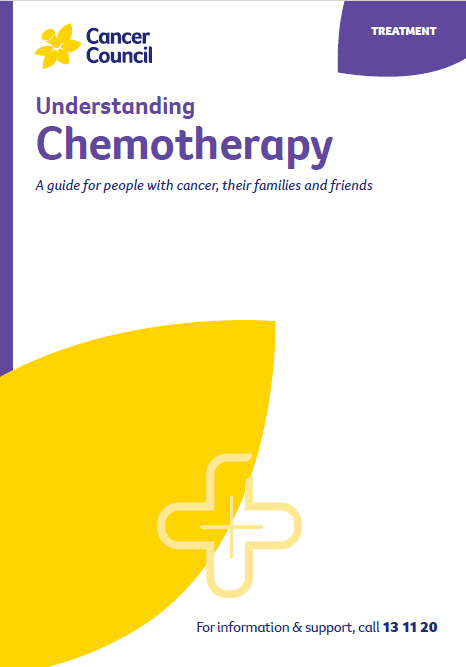- Home
- About Cancer
- Cancer treatment
- Chemotherapy
- Managing side effects
Managing side effects
Chemotherapy drugs can damage healthy, fast-growing cells, such as the new blood cells in bone marrow or cells in the mouth, stomach, skin, hair and reproductive organs. When healthy cells are damaged, it causes side effects. This section provides information and tips to help you manage some common side effects of chemotherapy.
Learn more about:
- Understanding side effects
- Blood-related side effects
- Nerve and muscle effects
- Feeling tired and lacking energy
- Hair loss
- Appetite changes, nausea or vomiting
- Constipation or diarrhoea
- Thinking and memory changes
- Mouth sores
- Skin and nail changes
- Sexuality, intimacy and fertility issues
- Other side effects
Understanding side effects
Everyone reacts to chemotherapy treatment differently. You may have many side effects or a few. Whether you experience side effects and whether they are mild or severe can depend on the type and dose of drugs you are given. Your reaction can also change from one treatment cycle to the next.
If you have side effects, they may start during the first few weeks of treatment and occasionally become more intense with each treatment cycle. Before treatment begins, your doctor, pharmacist or nurse will discuss the side effects to watch out for or report, how to help prevent or manage them, and who to contact after hours if you need help.
Keep a record of side effects
It can be useful to keep a record of your chemotherapy treatment and any side effects you develop. This will help you remember when you had side effects, how long they lasted and what helped to make them better. You can use a notebook, diary or an app on a smartphone or tablet.
Tell your treatment team about all side effects. They will be able to suggest ways to manage the side effects or, if appropriate, they may change the treatment schedule or arrange a break.
How long side effects may last
Most side effects are short term, but some may be permanent. Side effects tend to gradually improve once treatment stops and the normal, healthy cells recover. Most side effects can be managed.
Some side effects from chemotherapy may not show up for many months or years. These are called late effects. Before treatment starts, talk to your doctor about whether you are at risk of developing late effects and ways to prevent them.
Long term and late effects of treatment
Permanent side effects of chemotherapy may include damage to your heart, lungs, kidneys, nerve endings or reproductive organs. If damage to your heart muscle or lungs is a possibility, your doctor will monitor how your heart and lungs are working and adjust your chemotherapy if early changes are seen.
Occasionally, many years after having chemotherapy, some people develop a new, unrelated cancer. The risk of this is very low, but can increase with factors such as continuing to smoke or rare genetic conditions.
If you notice symptoms, even many years after treatment, ask your GP whether they could be related to the cancer treatment you received. Ask whether your hospital has a late effects clinic to help you manage any side effects you may experience after treatment.
For more on this, see Living well after cancer.
List the doses and names of your chemotherapy drugs, and the names of your specialists. This will save time if you become ill and need to visit a hospital emergency department. Make sure you tell the hospital staff that you are having chemotherapy, or other therapies such as targeted therapy and immunotherapy.
→ READ MORE: Blood-related side effects
Podcast for people affected by cancer
Listen now
More resources
A/Prof Kate Mahon, Director of Medical Oncology, Chris O’Brien Lifehouse, NSW; Katherine Bell, Dietetics Department, Liverpool Hospital, NSW; Brigitta Leben, Dietetics Department, Liverpool Hospital, NSW; Sophie Michele, 13 11 20 Consultant, Cancer Council SA; Dr Jess Smith, Medical Oncologist, Macquarie University Hospital, NSW; Karene Stewart, Consumer; Julie Teraci, Clinical Nurse Consultant, Skin Cancer and Melanoma, Cancer Network WA.
View the Cancer Council NSW editorial policy.
View all publications or call 13 11 20 for free printed copies.

